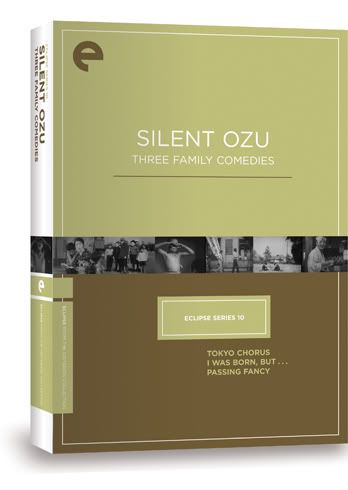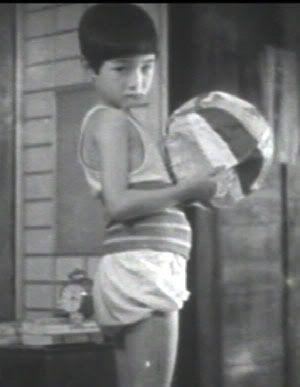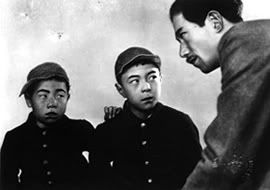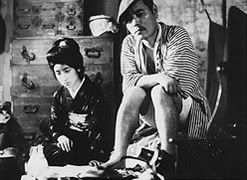By Dan Callahan Most dedicated film lovers are familiar with the elegiac '50s family dramas of Yasujiro Ozu, classics like Late Spring (1949) and Tokyo Story (1953). Much as they are cherished and respected, even his most fervent admirers have admitted the sameness of these films, in which a constantly smiling Setsuko Hara beams from her tatami mat and says, “Life is certainly disappointing!” After her pronouncement, Ozu cuts to a boat chugging along a river; he then cuts back to Hara, who has a measured shot/reverse shot conversation with one of her parents. Mom or Dad smiles finally, then reflects, “My dreams of youth are gone!” Then Ozu cuts to laundry flapping in the breeze against a mackerel sky, etc. To paraphrase Virginia Woolf, Ozu prefers to suffer and understand rather than to fight and enjoy. His Zen resignation is like a drug to some, but it must be said that Ozu’s basic attitude can seem complacent, even maddening, especially to American viewers whose birthright has always been the urge to tell someone off, make a change, start again. Of course, this “anything is possible” point of view has led to a lot of pain for most of our ambitious American strivers, so a pinch or more of Ozu’s philosophy can be beneficial to us.
Most dedicated film lovers are familiar with the elegiac '50s family dramas of Yasujiro Ozu, classics like Late Spring (1949) and Tokyo Story (1953). Much as they are cherished and respected, even his most fervent admirers have admitted the sameness of these films, in which a constantly smiling Setsuko Hara beams from her tatami mat and says, “Life is certainly disappointing!” After her pronouncement, Ozu cuts to a boat chugging along a river; he then cuts back to Hara, who has a measured shot/reverse shot conversation with one of her parents. Mom or Dad smiles finally, then reflects, “My dreams of youth are gone!” Then Ozu cuts to laundry flapping in the breeze against a mackerel sky, etc. To paraphrase Virginia Woolf, Ozu prefers to suffer and understand rather than to fight and enjoy. His Zen resignation is like a drug to some, but it must be said that Ozu’s basic attitude can seem complacent, even maddening, especially to American viewers whose birthright has always been the urge to tell someone off, make a change, start again. Of course, this “anything is possible” point of view has led to a lot of pain for most of our ambitious American strivers, so a pinch or more of Ozu’s philosophy can be beneficial to us. Ozu made a lot of films in the '30s, many of which are silent, some of which are lost, and these early films are seldom screened, so the new Eclipse series release, "Silent Ozu—Three Family Comedies", is valuable in that it lets us see the genesis of his refined late style. The initial movie in the set, Tokyo Chorus (1931) has been identified by some writers as Ozu’s first really mature work, and it does have a cohesiveness that some of his other '30s films lack. Chorus opens with a bunch of schoolboys being drilled in marching formation; one of the boys is rebellious, sticking his tongue out at the headmaster and making a face at him. This boy is also dreamy and contemplative: we see him sitting and staring at trees shivering in the wind, an image that haunts the rest of the movie. Then there’s a jump ahead in time, and the boy (Tokihiko Okada) is now an office drone with a wife and two small children. Okada’s daughter is played by a seven-year old Hideko Takamine, who grew up into a major actress for Mikio Naruse and other Japanese directors in the fifties. Takamine is instantly recognizable here; it’s startling to see her famously pinched, wary face on top of a little girl body. And she’s already a nag: “Daddy’s a liar!” baby Takamine whines, at one point.
Ozu made a lot of films in the '30s, many of which are silent, some of which are lost, and these early films are seldom screened, so the new Eclipse series release, "Silent Ozu—Three Family Comedies", is valuable in that it lets us see the genesis of his refined late style. The initial movie in the set, Tokyo Chorus (1931) has been identified by some writers as Ozu’s first really mature work, and it does have a cohesiveness that some of his other '30s films lack. Chorus opens with a bunch of schoolboys being drilled in marching formation; one of the boys is rebellious, sticking his tongue out at the headmaster and making a face at him. This boy is also dreamy and contemplative: we see him sitting and staring at trees shivering in the wind, an image that haunts the rest of the movie. Then there’s a jump ahead in time, and the boy (Tokihiko Okada) is now an office drone with a wife and two small children. Okada’s daughter is played by a seven-year old Hideko Takamine, who grew up into a major actress for Mikio Naruse and other Japanese directors in the fifties. Takamine is instantly recognizable here; it’s startling to see her famously pinched, wary face on top of a little girl body. And she’s already a nag: “Daddy’s a liar!” baby Takamine whines, at one point.
There’s an earthy, even scatological humor in Tokyo Chorus that Ozu would gradually pare away from his films, by and large, but his sense of resignation was present from the beginning. As Okada sits in a park, at loose ends and out of a job, a friend tells him that a bear has escaped from a nearby zoo. Okada smiles at his excited pal and says, “A bear getting out isn’t going to change our lives.” This “what will be will be” vibe is fine for some situations, but Ozu always takes it too far. After all, the bear might be right behind Okada and ready to eat him; the least he could do would be to get up and leave the area, but no, it doesn’t matter, he says, for nothing matters to him at this moment. At its worst, Ozu’s seemingly serene acceptance of life is actually close to do-nothing, harmful nihilism. Still, it’s hard to argue with the long scene where the desolate family tries to forget their problems with an extended game of patty cake; we can actually see Ozu’s anxious cheerfulness visibly burning away his characters’ worries. In the end, though, Ozu asks us to weep for his hero, forced to take a demeaning job with his old schoolmaster. Naruse also knew that his people had to make sacrifices to go on, but I’ll take the grown-up Takamine’s wry, almost humorous confrontation with her hated job at the end of When a Woman Ascends the Stairs (1960) over Ozu’s more adolescent and not at all funny look at defeat in Tokyo Chorus. I Was Born, But... (1932) is Ozu’s best-known early film, and it fully deserves its reputation. We watch two young boys doing ordinary things like cutting school and playing with other kids for a while before the real subject of the movie rears its ugly head. About an hour in, the boys sit and watch their wage slave father, Yoshii (Tatsuo Saito), make the same dumb faces and gestures over and over again, in movies that are being projected for some of his co-workers. Watching the co-workers’ reactions, Yoshii’s sons understand instinctively that their father is a figure of fun to the other adults. To a kid, especially a boy, there’s nothing worse than a realization like that, and their violent reaction at home later on is both grueling and fair. “You tell us to become somebody, but you’re nobody!” one of them shouts at Yoshii. Their father doesn’t defend himself, and their mother is an even weaker presence. “I give up,” says Yoshii, grabbing a bottle of liquor, as many Ozu men will do in later films. This scene of fatherly self-deprecation is unthinkable in an American movie, and it says a lot about Ozu’s essential despair, just as the final, small act of kindness on the part of one of the boys’ friends, which ends the film, says a lot about his appreciation of life’s small mercies.
I Was Born, But... (1932) is Ozu’s best-known early film, and it fully deserves its reputation. We watch two young boys doing ordinary things like cutting school and playing with other kids for a while before the real subject of the movie rears its ugly head. About an hour in, the boys sit and watch their wage slave father, Yoshii (Tatsuo Saito), make the same dumb faces and gestures over and over again, in movies that are being projected for some of his co-workers. Watching the co-workers’ reactions, Yoshii’s sons understand instinctively that their father is a figure of fun to the other adults. To a kid, especially a boy, there’s nothing worse than a realization like that, and their violent reaction at home later on is both grueling and fair. “You tell us to become somebody, but you’re nobody!” one of them shouts at Yoshii. Their father doesn’t defend himself, and their mother is an even weaker presence. “I give up,” says Yoshii, grabbing a bottle of liquor, as many Ozu men will do in later films. This scene of fatherly self-deprecation is unthinkable in an American movie, and it says a lot about Ozu’s essential despair, just as the final, small act of kindness on the part of one of the boys’ friends, which ends the film, says a lot about his appreciation of life’s small mercies. The third film in the set, Passing Fancy (1933), is nowhere near as good as the first two movies. It really wants to be a talkie; there are too many titles for all the conversation scenes, and the setpiece sequence, a confrontation between a boy and his drunken, good-for-nothing father, suffers in comparison with the tougher, similar scene in I Was Born, But...; what was true and moving in that film seems maudlin here. Passing Fancy ends with the contemplation of some trees, bringing us full circle back to the daydreaming image at the beginning of Tokyo Chorus. This was a director who stressed such continuity: Ozu’s technical skills are already impressive in these three early films, and his way of looking at life and people is as firm at age thirty as it would be at age fifty. Let us enjoy and even learn from Ozu, but let’s not accept all of his ideas about human forbearance without a dash or two of our own American “get up and go,” seasoned heavily with Naruse’s hardboiled black humor.
The third film in the set, Passing Fancy (1933), is nowhere near as good as the first two movies. It really wants to be a talkie; there are too many titles for all the conversation scenes, and the setpiece sequence, a confrontation between a boy and his drunken, good-for-nothing father, suffers in comparison with the tougher, similar scene in I Was Born, But...; what was true and moving in that film seems maudlin here. Passing Fancy ends with the contemplation of some trees, bringing us full circle back to the daydreaming image at the beginning of Tokyo Chorus. This was a director who stressed such continuity: Ozu’s technical skills are already impressive in these three early films, and his way of looking at life and people is as firm at age thirty as it would be at age fifty. Let us enjoy and even learn from Ozu, but let’s not accept all of his ideas about human forbearance without a dash or two of our own American “get up and go,” seasoned heavily with Naruse’s hardboiled black humor.
Image/Sound/Extras: Tokyo Chorus is the most visually innovative of the films, so it’s unfortunate that the image is so badly damaged; the entire movie is fighting against a veil of print decay. Donald Sosin’s piano score for Chorus is upbeat and sprightly even when things look bleakest for the characters, which works well at first, but begins to seem strange as the film goes on. I Was Born, But… and Passing Fancy look fine, and Sosin’s scores for both are excellent. No extras, since this is an Eclipse no-frills release.
_________________________________________________
House contributor Dan Callahan's writing has appeared in Slant Magazine, Bright Lights Film Journal and Senses of Cinema, among other publications.
Friday, December 1, 2006
Eclipse Series 10: Silent Ozu—Three Family Comedies
Subscribe to:
Post Comments (Atom)
No comments:
Post a Comment